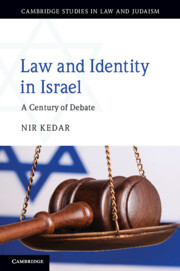Book contents
- Law and Identity in Israel
- Cambridge Studies in Law and Judaism
- Law and Identity in Israel
- Copyright page
- Dedication
- Contents
- Introduction
- Part I Seeking to Fashion National Law
- 1 Law and Culture in Early Zionist Literature
- 2 The Hebrew Peace Courts
- 3 The Hebrew Law Society
- 4 Why a Jewish-Hebrew System of Law Was Not Instituted at Independence
- 5 A Hebrew Constitution for the Jewish State
- 6 Jewish Law and Legislation in Israel
- Part II The Resurgence of Cultural Conflict
- Part III Zionism, Democracy, Law, and Culture
- Conclusion
- List of Legal Cases
- Legislation
- Bibliography
- Index
4 - Why a Jewish-Hebrew System of Law Was Not Instituted at Independence
from Part I - Seeking to Fashion National Law
Published online by Cambridge University Press: 24 October 2019
- Law and Identity in Israel
- Cambridge Studies in Law and Judaism
- Law and Identity in Israel
- Copyright page
- Dedication
- Contents
- Introduction
- Part I Seeking to Fashion National Law
- 1 Law and Culture in Early Zionist Literature
- 2 The Hebrew Peace Courts
- 3 The Hebrew Law Society
- 4 Why a Jewish-Hebrew System of Law Was Not Instituted at Independence
- 5 A Hebrew Constitution for the Jewish State
- 6 Jewish Law and Legislation in Israel
- Part II The Resurgence of Cultural Conflict
- Part III Zionism, Democracy, Law, and Culture
- Conclusion
- List of Legal Cases
- Legislation
- Bibliography
- Index
Summary
Chapter 4 analyzes abortive attempts to create a national Jewish system of law at the founding of the state. Under the circumstances of the 1948 Jewish-Arab War, the advocates of Hebrew law realized that it would not be possible to institute a comprehensive legal system based on Jewish-Hebrew foundations. Three options thus remained on the table. The first was to legislate as many laws based on Jewish-Hebrew law as possible, or at least to add Jewish-Hebrew chapters or sections to existing laws. The second was to insert into the new country’s declaration of independence or constitution, when they were drafted, a general declaration that Jewish-Hebrew law would be a principal source of legislation for the new country. The third was to have Hebrew law serve as the country’s residual law, meaning that it would apply in cases where there was a legal lacuna. Eventually the young state did not adopt any of these options choosing, at its founding, to circumvent the dispute that would be involved in grounding Jewish-Israeli identity in law.
Keywords
- Type
- Chapter
- Information
- Law and Identity in IsraelA Century of Debate, pp. 63 - 73Publisher: Cambridge University PressPrint publication year: 2019

